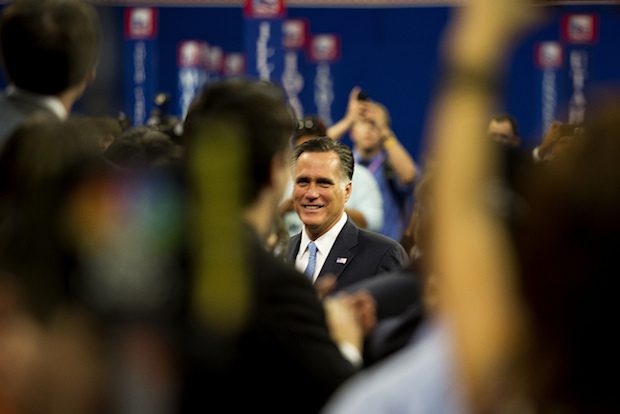Will Romney Go for Ron Paul’s Vote?

“I want to be president,” Mitt Romney told top Republican donors, who soon had this declaration spreading like wildfire through the media.
Romney’s desire to be president is no secret. What was less clear was whether he was done actively trying to fulfill this ambition.
After all, this runs counter to months of comments Romney has made in public suggesting he was unlikely to run. Many party donors and operatives viewed Romney 2016 as at best a contingency plan if Jeb Bush decided not to run and Chris Christie imploded. Barring an unforeseen setback, Bush is all but running for the nomination, with an ambitious plan to raise $100 million to scare potential rivals away. Christie also still seems interested in giving it a go and is no worse off than he’s been in the months since the New Jersey traffic lane closures scandal.
Yet reversals of publicly stated positions is nothing new for Romney. The former Massachusetts governor is also trying to be Bush’s unforeseen setback. His comments will freeze a certain number of donors in place, keeping them from signing up too quickly with Bush’s campaign.
There are usually two parts to the Republican presidential race: the entry of the establishment frontrunner and the informal conservative primary to decide who will be the main candidate on the right. The establishment candidate normally wins the nomination.
In the last two cycles, the conservative primary didn’t even come to a conclusive end before the establishment candidate began consolidating support. In 2008, Romney shared the conservative mantle with Mike Huckabee and Fred Thompson. Four years later, Rick Santorum didn’t wrest the title away from Newt Gingrich until after Florida, by which time the now-establishment Romney had a leg up.
If Bush, Christie, and Romney all follow through on their threats to run, Republicans will find themselves in unprecedented territory: there may be an establishment primary alongside the conservative one. And it creates the potential, at least, for the establishment vote to split.
Right now, all three of them seem likely to sing from the same establishment song sheet. They’ll run on domestic policies conservative enough to animate liberals in opposition but not equally inspiring to actual conservatives, a conventionally hawkish foreign policy likely to be implemented by the same people who gave us the Iraq War, and whatever else tickles the biggest donors’ fancies.
Will any of them decide to reach out to libertarians and realists? On paper, Romney is the strongest candidate. This may seem counterintuitive, given Romney’s propensity for substituting machismo for foreign-policy thought: “double Gitmo,” “no apologies,” etc.
But Romney also has a tendency to tell people what they want to hear. The fact that Bush’s doesn’t try to ingratiate himself to the base seems to be one of the reasons Romney is skeptical the former Florida governor can win the nomination. Was he pandering to hawks then and could he once again turn on a dime if it would distinguish him from Bush and Christie?
In 2008, Romney was the only major candidate not named Ron Paul who declined to defend the original decision to invade Iraq. In typical Romney fashion, he wasn’t willing to call the invasion a mistake either, protesting that such questions were an “unreasonable hypothetical,” a “non-sequitur,” even a “null set.”
Nevertheless, Romney’s reticence drew John McCain’s notice in a later debate. McCain scolded Romney for saying the surge was “apparently” working. “No, not apparently,” he hissed at Romney. “It’s working.” McCain also hit Romney for using “code words” implying he might be for withdrawal.
Romney didn’t use code words when he became the nominee in 2012, at least when he was reaching out to swing voters. “We don’t want another Iraq, we don’t want another Afghanistan,” he said in a debate with President Obama. “That’s not the right course for us.”
During the campaign for the nomination, Romney was generally hawkish. But he was also socially friendly with Ron Paul to a much greater degree than the other candidates, and he successfully sought Rand Paul’s endorsement. In his pre-endorsement conversation with the younger Paul, Romney sought to assure him there was some daylight between his foreign policy and George W. Bush’s.
The very slipperiness that makes Romney a possibility to change his foreign-policy tune might also undermine the maneuver’s effectiveness. After all, why would any voter who is skeptical of more Iraq-like misadventures believe him? Romney may say we don’t need another Iraq or Afghanistan, but he has steadfastly defended both.
Secondly, while Romney might be willing to pander to realists or libertarians in a general election—Gary Johnson took 1.2 million votes as the Libertarian Party nominee in 2012—they might be too small a group of Republicans to be worth the trouble in the primaries. Rand Paul would have to do well enough to convince Romney they are a constituency worth seeking, but not so well he remains in the race to carry them himself.
Third, a big reason Romney seems to want to run again is that he feels current world events—from Vladimir Putin’s regional power plays to struggles in nuclear negotiations with Iran—vindicate him on foreign policy. If so, he is more likely to be talking about his hawkish mumbo-jumbo from the primaries than his more centrist debate comments.
Finally, Romney has heard nothing but complaints about his handling of the one issue where he even mildly deviated from the donor class’ preferences—immigration.
The establishment’s jockeying for donor support is already underway. Voters looking for a less bellicose foreign policy will have to wait for someone competing for theirs.
W. James Antle III is managing editor of the Daily Caller and author of Devouring Freedom: Can Big Government Ever Be Stopped?